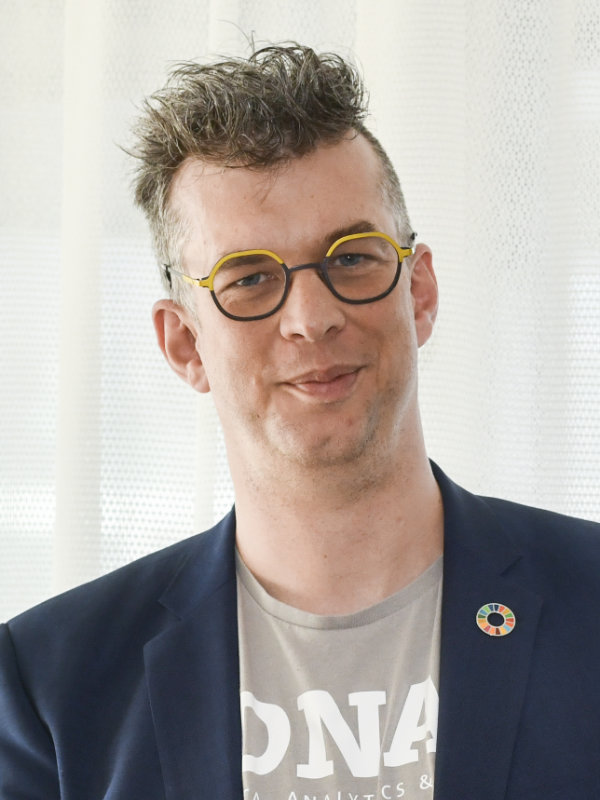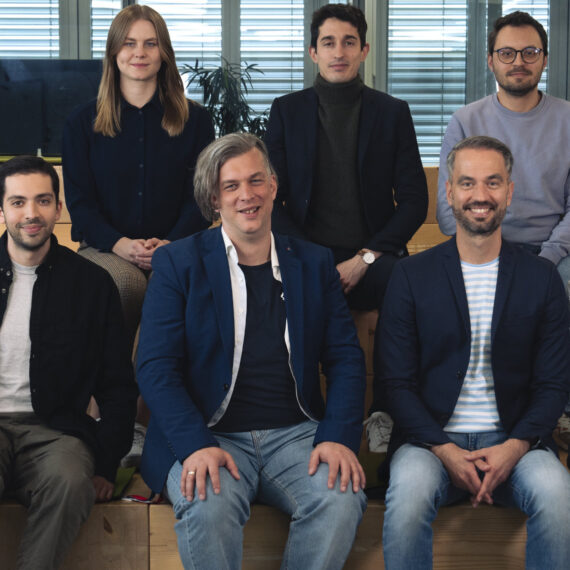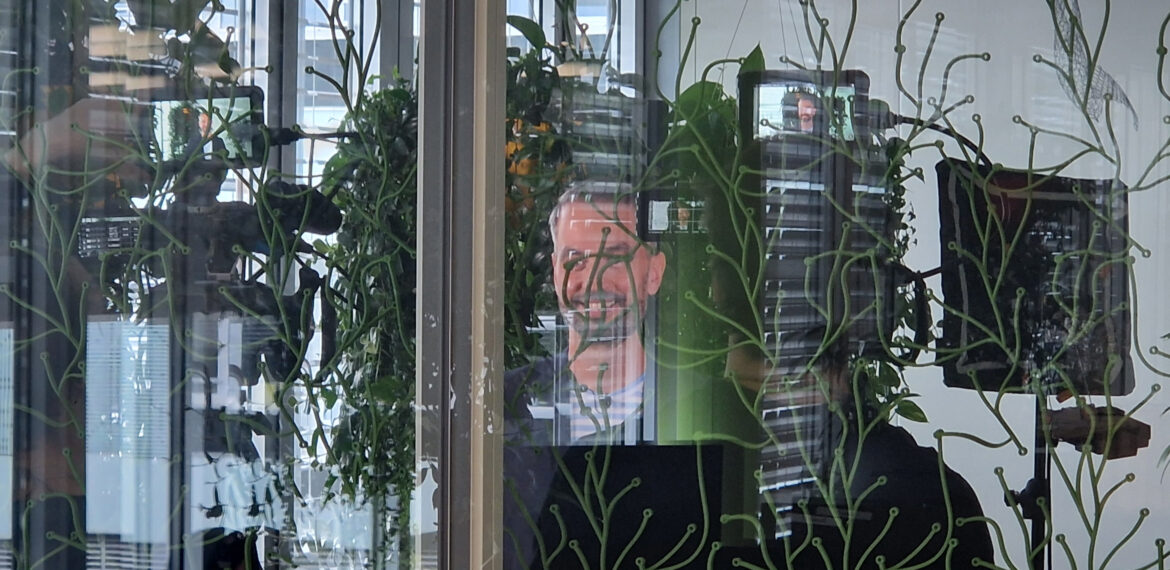In the Digital Lab, Swisscom conducts research into artificial intelligence solutions that will help improve its own processes while also benefiting customers. In the first part of this interview, Directors Daniel Dobos and Dominik Temerowski talk about the role of AI for Swisscom and the collaboration with the Swiss Federal Institute of Technology in Lausanne (EPFL).
It’s a bit of a walk from the EPFL metro station in Lausanne across the expansive campus to the Innovation Park. One of the modern buildings there is home to the Swisscom Digital Lab, which has been working with the university since 2016 to research innovations in the field of data and artificial intelligence.
The Lab itself has also come a long way, from projects with traditional machine learning to today’s research on generative AI’s large language models (LLMs). The lab is led by Daniel Dobos and Dominik Temerowski. The former manages the actual research, while the latter is responsible for economic implementation – both within Swisscom and for the benefit of customers.
In the first part of the interview, they provide information about their activities, Swisscom’s role in AI research and their collaboration with EPFL.
The interlocutors

Dr Daniel Dobos is Research Director at Swisscom. He is responsible for relations with universities, universities of applied sciences and other research institutions. Together with employees from all Swisscom business areas, he and his team develop solutions that use the latest research and technology developments for the benefit of Swisscom customers. Previously, he led research and AI data analysis projects at the CERN research centre and at the United Nations.
Dominik Temerowski is Director of AI & Innovation at Swisscom. Together with Swisscom’s business units, he develops AI-based innovations with a team of data scientists and machine learning engineers that create measurable added value for the company. Previously, he was responsible for partner management in the business customer division at Swisscom and previously at Deutsche Telekom, both of which focused on the digital transformation of B2B customers.

For most people, artificial intelligence is synonymous with generative AI. What impact are the boom and hype surrounding ChatGPT and other media having on the Digital Lab and Swisscom?
Daniel Dobos says: At Swisscom, we have been working in the field of artificial intelligence for a long time. At the IDIAP research centre in Martigny, we have been conducting AI projects for more than 30 years, and at EPFL we have been using machine learning for almost a decade. Transformer is the name of the architecture behind generative AI that drove the whole thing forward. The hype has led to a lot of confusion between the terms.
Become a digital leader
Developing sustainable business models with the help of AI? Or digitalise internal processes with low-code platforms? Discover other areas where you can drive your transformation and become a digital leader.
It is a continuous development. But the speed has increased dramatically, especially since 2022. In the meantime, even the researchers working in this field say that it is almost a full-time job to follow and classify this development. This is only possible in a strong team. Thanks to collaboration with world-leading researchers from ETHZ, EPFL, Stanford University and our outpost in Silicon Valley, we are able to keep abreast of current developments. This means we can be right at the front of the pack.
Temerowski: Artificial intelligence is a cross-sectional technology – just like bicycles, electricity and the internet. Each of these three cross-cutting technologies has revolutionised the economy and enabled innovation, and its benefits are not limited to individual sectors. Companies that relied early on on the innovative possibilities of the Internet quickly gained cost and revenue advantages. The same applies to AI today: At Swisscom, we see a future in which AI will be as ubiquitous as connectivity and support numerous services and products. In addition, AI will bring us significant benefits in terms of quality, efficiency and innovation in our operating model and at the platform level.
What role does artificial intelligence play for Swisscom, both for its own operations and for customers?
Daniel Dobos says: We are also looking for partnerships in the area of artificial intelligence, for example with Nvidia for the Swiss AI Platform. We don’t just focus on our own AI products. Instead, we evaluate all options that are of interest to the Swiss economy so that we understand the strengths and weaknesses of each individual solution. This allows us to advise customers impartially on the best solution for a particular problem. Sometimes it may well be from a hyperscaler. And in other cases, it can be something highly specialised, where data security or data storage in Switzerland is relevant and we build a tailor-made solution together with the customer.
‘What many people don’t realise is that Switzerland has been at the forefront of research in artificial intelligence for years.’
Daniel Dobos
This is no different in the AI environment than in other business areas. I think of it as a retail store. A specialist store offers chocolate from many different brands as well as a private label and advises customers which chocolate they like best. I believe that is also the role that we can play in the field of artificial intelligence, because there is simply no one solution that works for everyone. Even large suppliers do not have the right solution for every problem faced by a Swiss company.
Temerowski: Today, AI equates to competitiveness. Swisscom is generally strengthening its AI transformation with the help of talent development and the recruitment of AI specialists. At the Digital Lab, we contribute to this through research, innovation and targeted talent acquisition.
Every year in our lab alone, ten to 20 Master’s students at EPFL begin their Master’s thesis with a specific practical orientation. Every student works on the solution to the challenges of our departments. After graduation, we actively recruit from the cohort for one-year internships. The aim is for us to attract the best people to Swisscom at the end of this internship year – through follow-on positions in the lab or in the business areas for which they have already developed solutions.
Skilled workers are one of the most important resources for Switzerland as a business location. And especially in the age of AI, the need for AI experts is growing rapidly. In the Digital Lab, EPFL students take the step from theory to practice at a very early stage. In doing so, we are shaping the future for Swisscom and Switzerland.
Switzerland is strengthened by a strong domestic industry. In Swisscom, Switzerland has an independent provider of telecommunications and IT. This sovereignty will become even more important in the age of AI: From the network to AI applications and the underlying infrastructure. With the research collaborations in the Digital Lab, we are helping to ensure that Swisscom remains at the forefront of trust, quality and innovation in the next step.
How does the collaboration between the Digital Lab and EPFL work, and what are the benefits?
Daniel Dobos says: We’re a kind of bridge-builder. On the one hand, we take business needs that we have internally at Swisscom or learn from our customers. And on the other hand, we collect ideas. For example, when researchers come to us with an idea of how to use artificial intelligence to make networks more efficient or how to improve the user experience for our customers. Then we’ll look together at how we can incorporate this state-of-the-art research into the products we have at Swisscom.
‘Today, AI equates to competitiveness.’
Dominik Temerowski
Dominik and I often say we’re like two sides of the same coin: Innovation and research. Dominik will be responsible for developing highly structured AI solutions for Swisscom that contribute to quality, efficiency and innovation. For me in the research area, it’s more the opportunistic-creative part, where we also develop crazy ideas, so-called moonshots: What would it mean, for example, if we were to set up the first mobile cell on Mars? Would such innovations and projects also help us in our day-to-day business?
What many people don’t realise is that Switzerland has been at the forefront of research in artificial intelligence for years. With ETH Zurich and EPFL in particular, we are at the forefront of this. We have great potential here, which we can use for our people and for our economy.
But when it comes to the economic implementation of research, we are not yet really at the forefront. If you look at where AI start-ups are created, they are usually still in Silicon Valley and increasingly also in Asia, Singapore, China and Japan. In collaboration with UBS and many other partners, Deep Tech Nation Switzerland is trying to muster the necessary financial strength in venture capital so that Switzerland does not gradually fall behind in international competition.
What are the activities and objectives of the Digital Lab?
Daniel Dobos says: We recently worked with a student to fine-tune the first Llama 3 models on an ethical training dataset a few days after their release. We have defined and significantly improved the answers of Llama 3 to ethical questions. This makes us one of the top 10 to 15 research institutions and companies in the world to achieve this. This was only possible in collaboration with EPFL and because we are well advanced in research.
We need to use and test new developments to understand them. In this way, we get to a level as quickly as possible that we can trust the systems and integrate them together with customers in day-to-day use.
But what scares me a bit is the unpredictability of the results. The large language models are a black box. At the moment, a lot of development work is being done around the world to understand how such models make decisions. Here, we work with various companies and universities to be at the forefront. Explainable AI and reasoning are keywords, and being able to demonstrate in a human-comprehensible way why a model decides one way or another.
Traceability is certainly an important factor in using generative AI for business decisions. Only then can you understand why you now receive either recommendation A or recommendation B.
MSM Research: artificial intelligence
Artifical intelligence on the way to becoming a game changer: Find out in the latest study by MSM Research how Swiss companies use AI and what you should consider when using it.
Header image: The core team of the Digital Lab with Daniel Dobos (front; second from left) and Dominik Temerowski (front; third from left).






